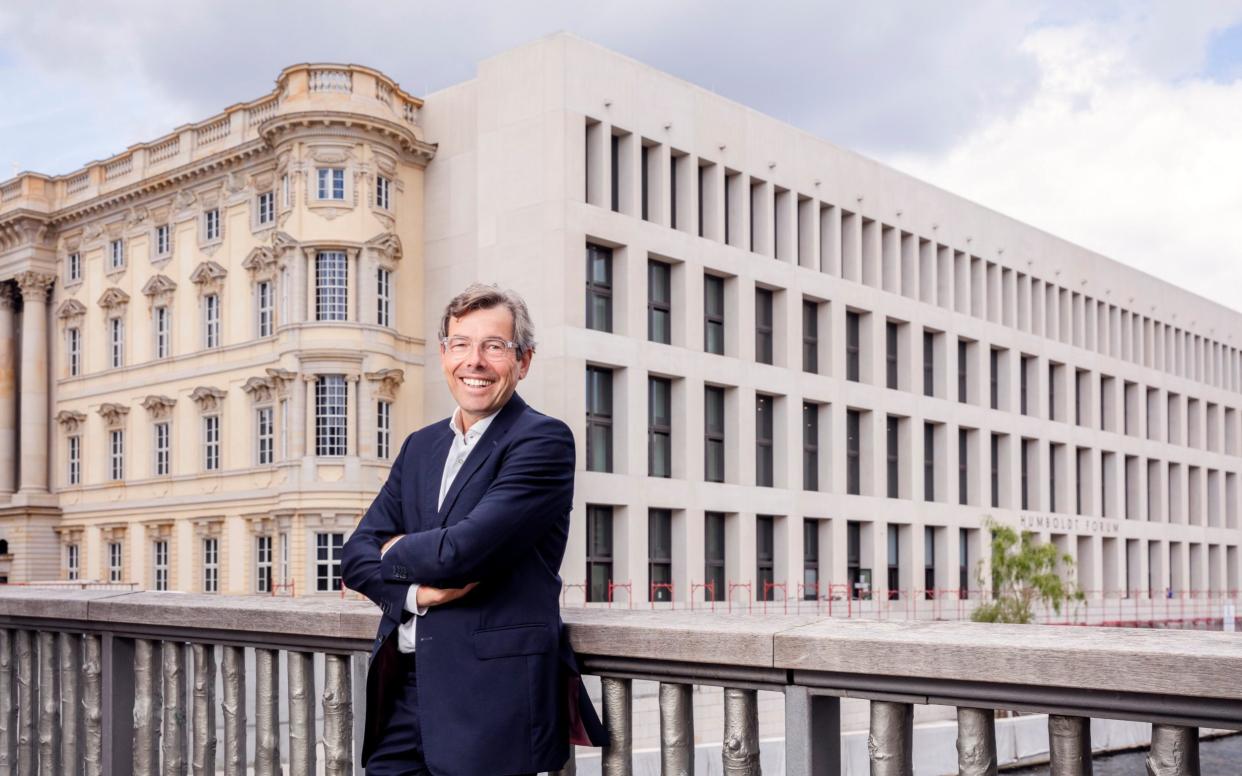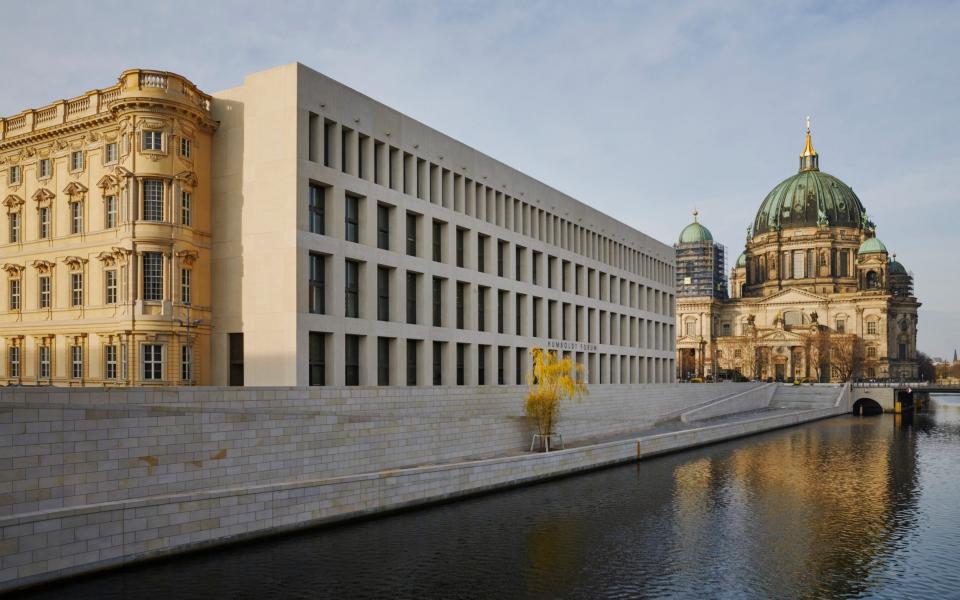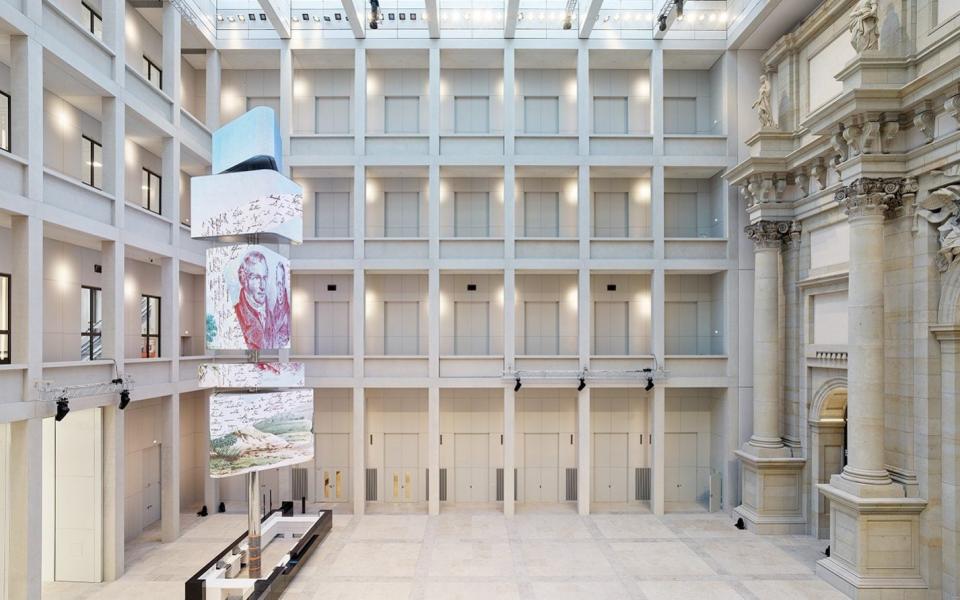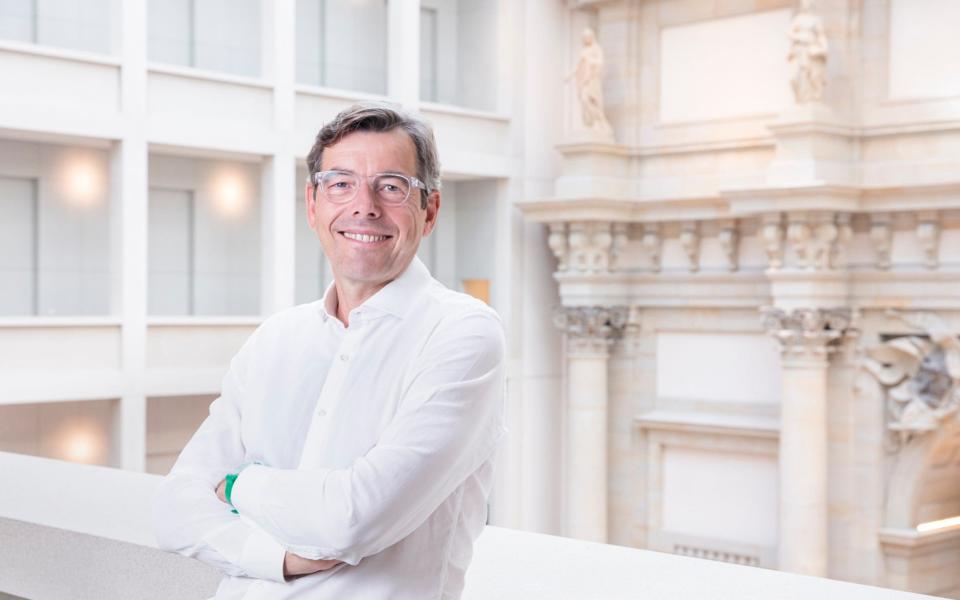Meet the man behind Europe’s controversial new cultural project: ‘It’s our duty to confront the past’

It’s by some way the biggest cultural project being undertaken in Europe right now. The Humboldt Forum in the heart of Berlin has cost €660 million and will occupy a new building with a floor area of 30,000 square metres (roughly the same as the V&A).
It has been almost two decades in the planning and is perhaps best known in this country as the destination for which Neil MacGregor left the British Museum in 2015. He served as one of a trio of directors until 2018, when all three handed over the reins to Professor Hartmut Dorgerloh, who assumed the title of General Director.
“It has been a long two years,” Dorgerloh tells me over Zoom with something approaching gallows humour.
He has just had to postpone the Humboldt Forum’s grand opening for a third time – “until who knows when”, he says. “I’ve given up looking in my crystal ball.”
The venue will be home to the collections of Germany’s Ethnological Museum and Asian Art Museum; a permanent display on the history of Berlin; an open laboratory run by Humboldt University; as well as spaces for standalone exhibitions, dance, concerts and film.

Alas, a faulty air conditioning system was one of a number of technical issues that put back the first scheduled opening in the summer of 2019. The interruption of supply chains by Covid-19 forced another postponement earlier this year; and now a third attempt at opening has been thwarted, just this month, by government tightening of lockdown restrictions in Berlin.
It rather gives the lie to stereotypical views about German efficiency. How about another widely held view: that Germany values the arts more highly than any other nation?
“That’s not quite right,” says Dorgerloh. “It’s just a different cultural landscape in Germany. Because we’re a federal republic, responsibility for the arts is mostly given over to states and municipalities. This means concert halls, theatres and art galleries are spread across the nation, where in France or the UK, say, they tend to be more centralised.”
Sure, but state funding for arts institutions in Germany dwarfs what’s offered elsewhere. To give a comparison that might be considered typical: 80 per cent of the budget for the Humboldt Forum has come from the public purse, where the equivalent figure for Tate Modern’s 2016 extension was 22 per cent.
“I’m not going to say one approach is better or worse,” says Dorgerloh. “In Britain, there’s a dynamism in the way many museums operate. There’s also an engagement with the community through education and outreach programmes that is an example to everyone.”

What does he think about the German government’s response to Covid? By the end of March, it had already outlined a $1.17 billion bailout for the cultural sector. “I think it was effective and pleased many people,” Dorgerloh says, “though we didn’t see any of that money at the Humboldt Forum.”
The bailout was aimed predominantly at arts outfits that don't already receive state funding. In that respect, it can’t really be compared with the £1.57 billion Culture Recovery Fund announced for the UK in July.
Dorgerloh, 58, was born and bred in East Berlin, yet considers himself something of an Anglophile. One of the first trips he took after the Berlin Wall came down was to England, where he stayed in many a friendly B&B and revelled in “the wall-to-wall, pink carpet in the bathrooms.”
On Wednesday, Dorgerloh will host a digital unveiling of the Humboldt Forum – featuring a tour of the building for visitors to its website. “We decided we wanted to mark the venue’s completion”, he says, “even if it’ll have a bitter taste without people inside.”
The Forum is named after brothers Wilhelm and Alexander von Humboldt, the Enlightenment polymaths. Controversy has raged since its conception. Thanks to a decision by the Bundestag in 2002, its building is a faithful recreation of the Stadtschloss: the Hohenzollern dynasty’s Baroque palace that stood on the site for centuries, before demolition by the GDR in 1950. Many have queried what an edifice that harks back to monarchical Germany means in a 21st-Century democracy.

Given the immense cost, others have questioned whether Berlin needs a new museum. The Humboldt Forum is located on Unter den Linden boulevard, opposite the famed Museum Island. “Our institution isn’t actually a museum,” Dorgerloh counters. “It’s more than that. As the name suggests, it’s a forum: in which we want the big issues of the day being addressed.” (One early exhibition planned is on the ivory trade.)
The loudest complaint of all is that many of the Ethnological Museum’s 500,000 objects have iffy provenance. One of the Forum’s advisory board members, Bénédicte Savoy, resigned in 2017, citing a lack of research into how items had ended up in Berlin – especially those from Africa, where German colonialists carried out atrocities in Tanzania and Namibia at the turn of the 20th Century.
“Blood is dripping” from countless objects, Savoy claimed. Dorgerloh’s response? “By putting these works on show, we can be catalysts for a new discussion and new understanding of the cultures they’re from – and also of Germany’s colonial past.”
In the divide between those who’d tackle that past by toppling statues and those who’d contextualise it, Dorgerloh is among the latter. “We Europeans can no longer claim to be the sovereign interpreters of these works, though. Which is why at the Humboldt Forum we’ve been working with communities in the origin countries to help with our displays.”
Given the way Germany has had to deal with its Nazi legacy, does Dorgreloh feel it can give other nations a lesson in how to handle a troubled history? “I don’t think, as a country, we’re in a position to be giving lessons to anyone,” he says. “But if we can share our experience, it’s that the past often hurts, it’s uncomfortable, yet we all have a duty to confront it.”
The digital unveiling of the Humboldt Forum is on Weds Dec 16 at 6pm. Visit humboldtforum.org/en

